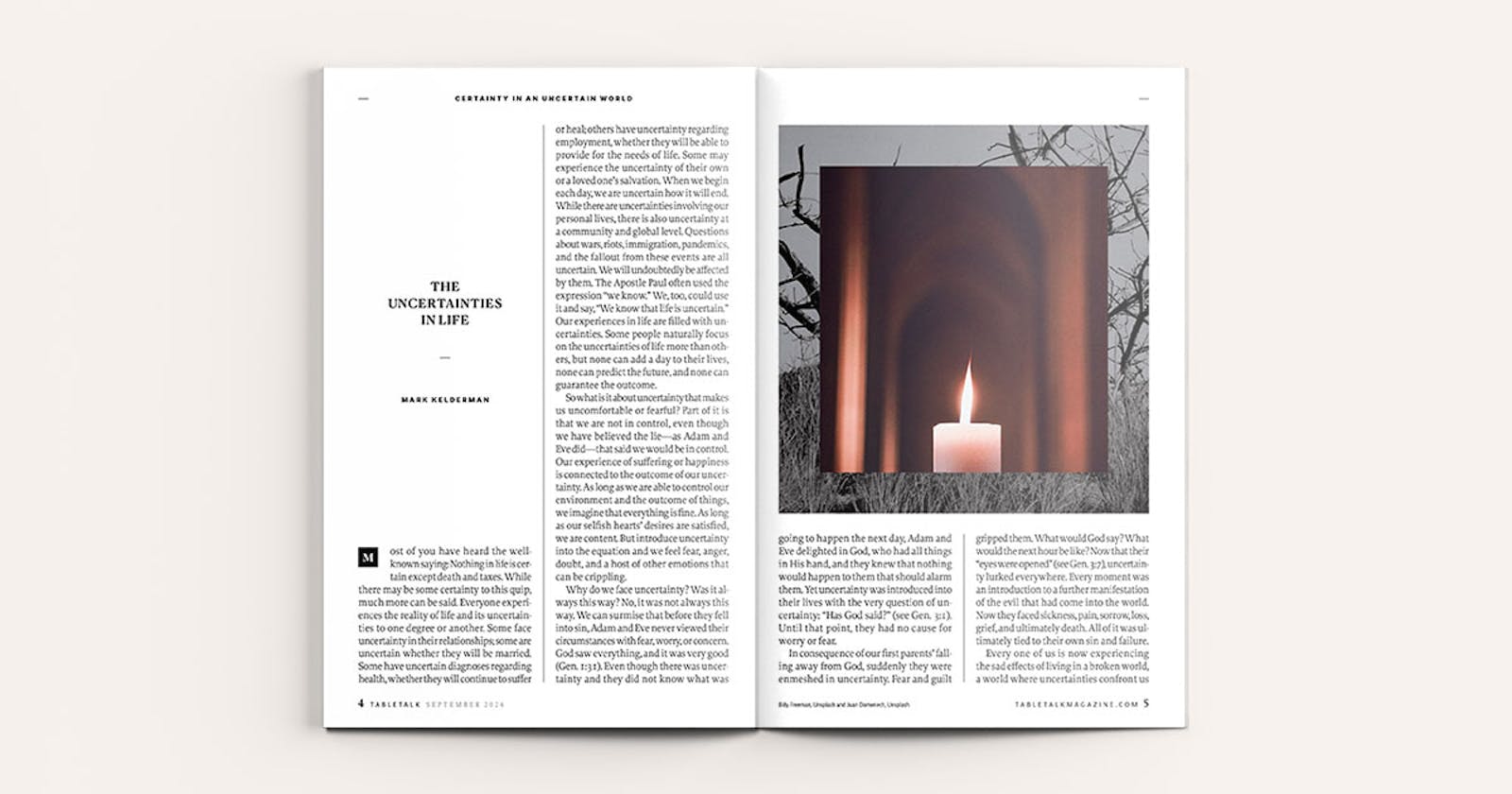
Request your free, three-month trial to Tabletalk magazine. You’ll receive the print issue monthly and gain immediate digital access to decades of archives. This trial is risk-free. No credit card required.
Try Tabletalk NowAlready receive Tabletalk magazine every month?
Verify your email address to gain unlimited access.
Most of you have heard the well-known saying: Nothing in life is certain except death and taxes. While there may be some certainty to this quip, much more can be said. Everyone experiences the reality of life and its uncertainties to one degree or another. Some face uncertainty in their relationships; some are uncertain whether they will be married. Some have uncertain diagnoses regarding health, whether they will continue to suffer or heal; others have uncertainty regarding employment, whether they will be able to provide for the needs of life. Some may experience the uncertainty of their own or a loved one’s salvation. When we begin each day, we are uncertain how it will end. While there are uncertainties involving our personal lives, there is also uncertainty at a community and global level. Questions about wars, riots, immigration, pandemics, and the fallout from these events are all uncertain. We will undoubtedly be affected by them. The Apostle Paul often used the expression “we know.” We, too, could use it and say, “We know that life is uncertain.” Our experiences in life are filled with uncertainties. Some people naturally focus on the uncertainties of life more than others, but none can add a day to their lives, none can predict the future, and none can guarantee the outcome.
So what is it about uncertainty that makes us uncomfortable or fearful? Part of it is that we are not in control, even though we have believed the lie—as Adam and Eve did—that said we would be in control. Our experience of suffering or happiness is connected to the outcome of our uncertainty. As long as we are able to control our environment and the outcome of things, we imagine that everything is fine. As long as our selfish hearts’ desires are satisfied, we are content. But introduce uncertainty into the equation and we feel fear, anger, doubt, and a host of other emotions that can be crippling.
Why do we face uncertainty? Was it always this way? No, it was not always this way. We can surmise that before they fell into sin, Adam and Eve never viewed their circumstances with fear, worry, or concern. God saw everything, and it was very good (Gen. 1:31). Even though there was uncertainty and they did not know what was going to happen the next day, Adam and Eve delighted in God, who had all things in His hand, and they knew that nothing would happen to them that should alarm them. Yet uncertainty was introduced into their lives with the very question of uncertainty: “Has God said?” (see Gen. 3:1). Until that point, they had no cause for worry or fear.
In consequence of our first parents’ falling away from God, suddenly they were enmeshed in uncertainty. Fear and guilt gripped them. What would God say? What would the next hour be like? Now that their “eyes were opened” (see Gen. 3:7), uncertainty lurked everywhere. Every moment was an introduction to a further manifestation of the evil that had come into the world. Now they faced sickness, pain, sorrow, loss, grief, and ultimately death. All of it was ultimately tied to their own sin and failure.

Every one of us is now experiencing the sad effects of living in a broken world, a world where uncertainties confront us each day. This is our reality; we cannot ignore this truth and push it aside. The real question is not whether we will encounter and experience uncertainty but how we will respond to the uncertainty of the things that we encounter.
Many people have recommendations on how to overcome uncertainty. Some would say that you need to just go with the flow and accept that life is random. In other words, there is no ultimate purpose; you just need to make the most of what you have been given. If life gives you lemons, make lemonade. Others get closer to something of a response when they say that we need to focus on gratitude and recognize the blessings that we already have. Still, this brings no lasting certainty. Yet others say that we need to just learn more; getting more information will help us understand better what is happening and bring explanation.
Is there no hope in our current situation? There is a hope we can have that is certain in an uncertain world (Rom. 8:28; 2 Cor. 5:1; 1 John 3:2). Continue reading the next articles and know for yourself the confidence that belongs to a people who have placed their hope in Someone other than themselves. These cling to Jesus Christ alone. They have confidence in Someone who will never disappoint or fail them. Do you?
